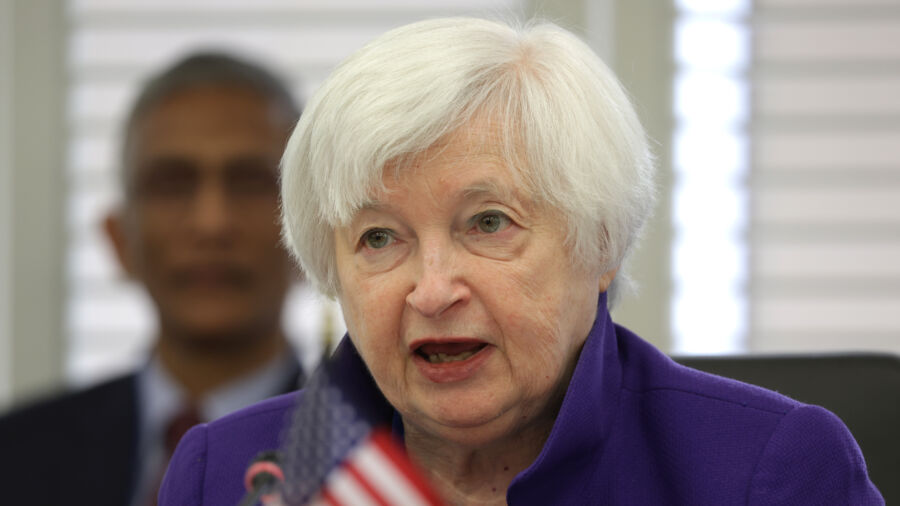The U.S. Treasury cash balance inside its bank account at the Federal Reserve continues to shrink at an alarming level as the department attempts to prevent the federal government from defaulting.
According to the latest Daily Treasury Statement, the Treasury General Account (TGA) opening balance was $87.431 billion on May 16, down from about $143 billion on May 12. This represents a 40 percent decline and the lowest level since April 12.
At the beginning of the month, the Treasury’s cash balance was $316.381 billion, down roughly 72 percent.
Officials use the TGA to cover the debt service on government bonds, effectively stopping the United States from defaulting. It is also used to pay for a plethora of federal outlays, including employee salaries, and collect funds from the sale of Treasury debt.
Experts say that the TGA will be replenished in the middle of next month when the government’s bank account sees an influx of deposits from tax payments. However, the sharpest cash drawdown since March 1 has ignited some concern that the Treasury Department might not possess enough funds to keep up with payments. This could potentially set the stage for Washington to default on its obligations.

Since the federal government reached its debt limit of $31.4 trillion in January, the Treasury has been employing extraordinary measures, such as suspending sales of state and local government series Treasury securities, halting the reinvestment of the Government Securities Investment Fund, and redeeming existing investments of the Civil Service Retirement and Disability Fund and the Postal Service Retiree Health Benefits Fund.
But Treasury Secretary Janet Yellen has repeatedly warned that the United States could potentially run out of money to pay its bills on June 1.
In a recent letter to House Speaker Kevin McCarthy (R-Calif.), Yellen urged Congress to act immediately “to protect the full faith and credit of the United States.”
“With additional information now available, I am writing to note that we still estimate that Treasury will likely no longer be able to satisfy all of the government’s obligations if Congress has not acted to raise or suspend the debt limit by early June, and potentially as early as June 1,” she wrote.
Yellen promised to offer an update to Congress next week.
“The actual date Treasury exhausts extraordinary measures could be a number of days or weeks later than these estimates,” she added.
US Leaders Offer Reassurance
Despite tense discussions, U.S. leaders have assured the public that the government will not default on its debt.
“I think at the end of the day, we do not have a debt default,” McCarthy told CNBC on May 17.
“The only thing I’m confident about is now we have a structure to find a way to come to a conclusion,” McCarthy said. “The timeline is very tight. But we’re going to make sure we’re in the room and get this done.”
Before President Joe Biden’s trip to the G-7 summit in Japan, it was revealed that there would be daily and direct negotiations between Rep. Garret Graves (R-La.) and two White House officials: Office of Management and Budget head Shalanda Young and key Biden adviser Steve Ricchetti.
House GOP leaders have presented several provisions to raise the debt ceiling. This includes rescinding $30 billion in unspent COVID-19 relief funds, capping government spending through the remainder of Biden’s term, reforming permitting rules to rejuvenate domestic energy production and development, and imposing work requirements to access federal aid programs.
Democrats have pushed back against some of these proposals, especially work requirements.
McCarthy called them “responsible” as they would support the economy, improve the supply chain, and help people find employment. But House Minority Leader Hakeem Jeffries (D-N.Y.) said they were “entirely unreasonable,” adding that the last time they were discussed in 2018, the GOP voted against these measures.
“It’s entirely unreasonable to think that at this particular point in time, in the context of a debt ceiling showdown that has been manufactured, as part of an effort to avoid default, that these types of so-called work requirements can be imposed on the American people,” Jeffries told the business news network.
Even with the tense back-and-forth exchanges between both sides of the aisle, political and financial observers note that talks are moving forward as Biden confirmed he would cut his overseas trip short and return to the nation’s capital on May 21.
“Despite both sides being far apart, everyone knows the catastrophic consequences of an eventual U.S. default, and no one is ready to push the U.S. into that black hole,” said Ipek Ozkardeskaya, senior analyst at Swissquote Bank, in a note.
From The Epoch Times

